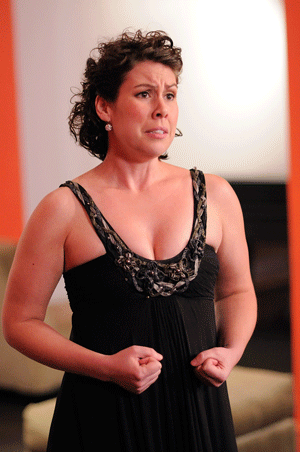 Christy Lombardozzi as Almira
Christy Lombardozzi as Almira
That latter stat defies all the rest just now:
Small opera companies are thriving. My post-Met-season has included Holst,
Telemann, Richard Strauss and De Falla; Rossini, Gay, Rachmaninoff, Chabrier
and Saint-Saëns lurk in my near future; and now the American professional
premiere of Handel’s tyro effort, Almira (1705), has been presented
by a youthful group called operamission, providing four hours of pleasure for
any Handelian who chanced through the Flatiron District.
Almira was composed by the 19-year-old Saxon who had not yet gone
to Italy to have his rough edges planed, for Hamburg’s Theater am
Gänsemarkt, the largest and grandest private opera house in Northern Europe,
which for a quarter century had been importing works by the likes of Lully,
Cavalli and Steffani and “improving” them to the taste of that rich and
sophisticated imperial free city, no egotistical royal court being around to
interfere. An entirely homegrown school of opera-making had arisen to exploit
this setting. Among its charms was a rear wall that could be opened after the
celebratory conclusion of a performance for a fireworks display on the River
Elbe.
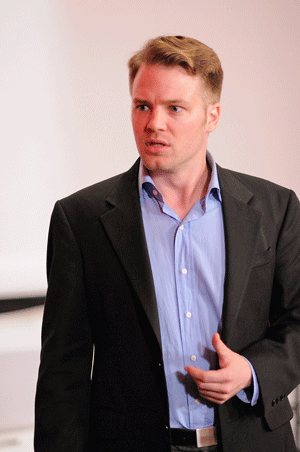 Michael Weyandt as Fernando
Michael Weyandt as Fernando
Some Gänsemarkt operas (such as Telemann’s Orpheus, recently
given its New York premiere by the City Opera) mixed two or three languages,
and the local style was also mongrel in the extreme. There was, if
operamission’s Almira is exemplary, far less egotism, less of
artists so confident of audience adulation that they stepped out of character
to over-ornament the dramatic event. That is the direction opera took in Italy
(and, under Handel’s auspices, would move in England), but it had not come to
Hamburg. The stories enacted were long and foolish, but the pace was swift, and
young Handel was already a tunesmith to rank with the best. The merchants of
Hamburg got their money’s worth and so, three hundred years later, did we.
Another local peculiarity in Hamburg was the absence of the Italian custom
of using castrati. Heroes and villains were generally sung by tenors and
basses, which made the operas a little easier for later generations to perform
and to accept—the program for this Almira calls it “the only
Handel opera staged during the nineteenth century.” (In Hamburg and Leipzig,
“severely truncated.”) Today, however, the lack of male altos or women in
trousers may be a hard for the contemporary audience for baroque opera to
swallow when attending Almira. Sorry: Tenors and basses is what we got
here, though they are required to be considerably more flexible than the male
singers of the nineteenth century would be.
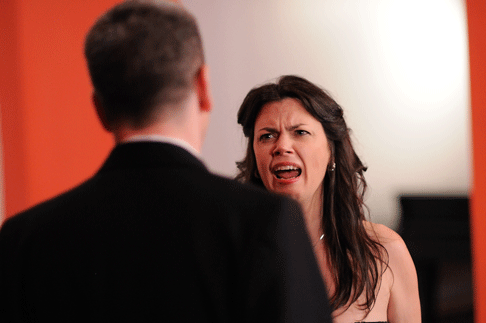 Keith Jameson as Osman and Nell Snaidas as Edilia
Keith Jameson as Osman and Nell Snaidas as Edilia
Almira, Königin von Kastilien (Almira, Queen of Castile) mixes
languages (German and Italian—the libretto is a bit of a hodgepodge) and
styles with bits of plot derived from many sources. Winton Dean, the grand
authority on Handel’s operas, sounds impatient with it in his study of
Handel’s operatic oeuvre, condemning him for not deepening the characters or
straightening out the story with its coincidences and contingencies, letters
gone awry, confessions overheard and misunderstood. To the lover of Handel’s
mature output, however, the score is frankly astonishing for what it does
achieve, the way the young genius contrasts his sets of rival lovers in their
rival clichés, the way the grandeur demanded by audiences in wealthy Hamburg
was worked into the story in procession and dance, the way the manners of the
different source schools (French, Italian, German) were maneuvered to create a
more or less seamless piece of theater and, most of all, the flood of melody
already at his command. To expect the more personal maturity of his greatest
works would be churlish. Almira is a delight on its own terms, and its
own terms (minus gaudy costumes and sets) are how operamission takes it.
The lobby of the Gershwin Hotel on East 27th Street (right beside the Sex
Museum, you can’t miss it) is a tall room. The 21-piece band of original
instruments, recorders, valveless horns, baroque bassoon, cello,
harpsichord—was that a viola da gamba joining in the recits?—is stuck at
one end of the L-shaped playing space, which permits double doors to open for
grand entrances, and there’s some room for court dances by a tiny corps de
ballet.
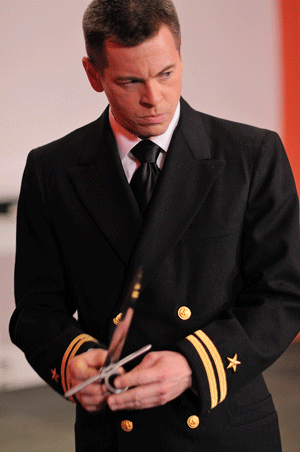 Keith Jameson as Osman
Keith Jameson as Osman
A single lobby pillar did duty as a tree, an arras, all sorts of
concealing partition. The audience had the remainder of the room, so some
head-swiveling to follow the action was required. Not the least of the
pleasures of the occasion was the absence of titles of any kind. A detailed
synopsis in the program included the texts of all the arias (both sung and
translation) and the lights were up (as in Handel’s day) so that they could
be read, but comprehension of the complicated and unfamiliar plot was left to
the expressiveness and acting chops of the singers. None of them had any
trouble getting the story across. Free of blinking and distracting
translations, we could revel in music and its performance. I do hope
operamission retains this tradition.
In brief, Almira (Christy Lombardozzi), newly-crowned Queen of Castile, is
in search of a husband. She inclines towards the foundling Fernando (Michael
Weyandt) who is, in fact, in love with her, but for typical libretto reasons
she thinks he’s in love with her cousin Edilia (Nell Snaidas). This confusion
is encouraged by underhanded Osman (Keith Jameson, whom you may recall as the
Apprentice in the Met’s recent Billy Budd), who is Fernando’s
foster brother and has been flirting with Edilia himself, all of which goes by
the board when he hopes to attain the crown matrimonial. His father, the regent
Consalvo (Mark Risinger), hopes to marry the queen off to a man of proper
birth, that is, not Fernando. That would be more than enough plot for the
mature Handel (when he was hiring imported Italian singers for his own
company), but on the Gänsemarkt’s thaler, he added Bellante
(Kristen Plumley), who is also in love with Osman and therefore spurns
Consalvo’s antiquated flirtations, and a Mauretanian king, Raymondo (David
Kravitz), who hopes to woo Almira but, happily, falls for Edilia instead. All
we need for denouement is the discovery that Fernando is of noble birth, a
long-lost son of Consalvo’s, and all three couples may marry—and do.
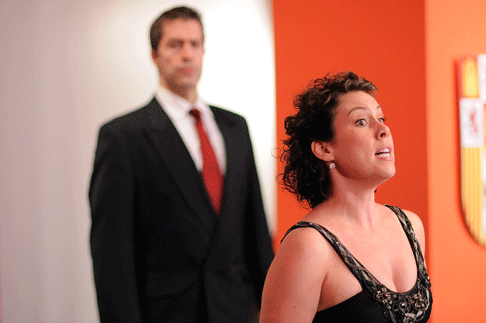 Mark Risinger as Consalvo and Christy Lombardozzi as Almira
Mark Risinger as Consalvo and Christy Lombardozzi as Almira
These regal types, honorable or otherwise, are served by Tabarco (Karim
Sulayman). The sarcastic servant is another Gänsemarkt tradition (as those who
attended Conradi’s Ariadne in Boston will recall); he extols gold
and drink, doubts everyone’s high-flown sentiments, cracks wise about
insincere young lovers and ridiculous old ones, attempts blackmail and
information leakage, and generally cuts the exalted brew. His lineage is
actually very exalted, for he traces his ancestry to Pseudolus, Mosca,
Juliet’s Nurse, Hamlet’s gravediggers and Sancho Panza, and his operatic
descent is grander still: Mozart’s Leporello and Papageno, the Sacristan in
Tosca and the Noctambulist in Louise. We need him to remind
us (and the other characters) what planet we live on. It isn’t just
highfalutin planet opera, or not all the time.
To find a singer or two worthy of attention and able in practice in one of these small companies is nothing unusual; it is one of the joys of going to them. To find eight excellent singers in eight wide-ranging roles in such a company is astonishing, but that was the case with operamission's Almira.
There are three sopranos here, you will note, and (like all characters in
opera seria), they are obliged to offer arias of a variety of states
of mind: yearning, wrath, flirtation, outrage, tragic renunciation.
Operamission’s music director, Jennifer Peterson, who conducted from the
harpsichord, figured out how to vary the voices nicely, from Lombardozzi’s
long, pure lines of queenly suffering to Snaidas’s high, spiky staccati of
merriment or anger and Plumley’s gracious or dubious sentiments. Considering
how interchangeable were their feelings (each lady feels amorously misused by
someone or other), they individuated nicely.
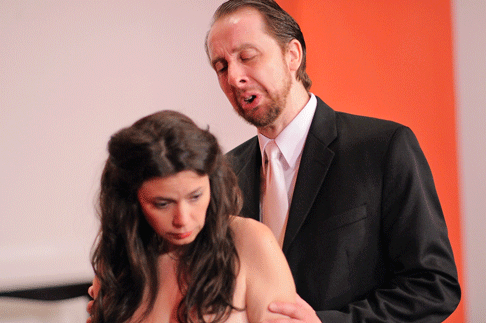 David Kravitz as Raymondo and Nell Snaidas as Edilia
David Kravitz as Raymondo and Nell Snaidas as Edilia
Square-shouldered and handsome, Michael Weyandt ably deployed his agile
baritone to proper stone-faced Dudley Do-Right effect as Fernando, the
all-but-uncomplaining (ten arias) object of everybody’s plots and betrayals.
Keith Jameson, as his devious brother Osman, had much more fun, skulking and
conniving. His tenor seems a bit grainy for leading lover roles in any case,
and his stage personality thrives on shifty characters. Mark Risinger sang the
grandee Consalvo with poise and dignity but did not quite convince as a
despairing lover. David Kravitz’s Raymondo was all sly politician until
Edilia stole his heart, when his lyric bass found a warmer element. Karim
Sulayman, who specializes in wisecracking servants (I’ve seen him with
Vertical Players and Opera Lafayette) had more fun than anybody; plot
shenanigans never unsettle his enjoyable light bass. I’m not sure which I’d
look forward to more: His Leporello or his Osmin (in Seraglio).
The staging by Jeff Caldwell made witty use of an awkwardly shaped stage and
less than grandiose forces to keep us on the proper page of the plot and happy
with its impressive length. This was a performance without a single mis-cast
singer or actor in eight long roles, which makes one eager to hear whatever
operamission comes up with.
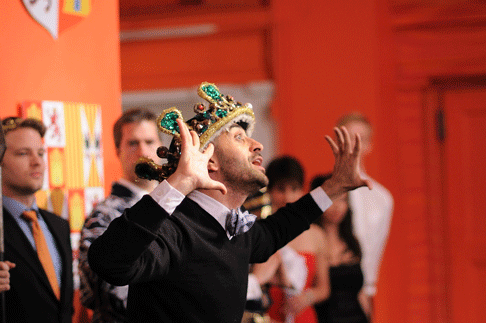 Karim Sulayman as Tabaco
Karim Sulayman as Tabaco
Due perhaps to an audience so intent that it withheld applause until the end
of the evening — or perhaps to an absence of da capo repeats with their
self-glorifying fireworks — the long score moved swiftly and delightfully
through a lengthy score to a joyful conclusion.
John Yohalem
Click here for the program for this production.







